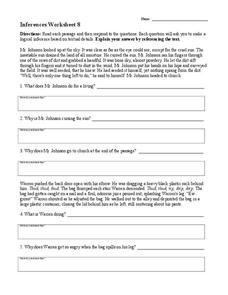Have Fun Teaching
You Make the Call (10)
What will happen next? Young writers plot what will happen next after studying the clues in four story starters.
Reading Worksheets
Inferences Worksheet 8
Lead your class toward mastery of making inferences with a straightforward worksheet. Pupils read four short passages and make inferences based on the questions asked about each passage. They explain their reasoning for each...
Scholastic
The Seven Wonders of the Ancient World
The Colossus of Rhodes, the Hanging Gardens of Babylon, the Lighthouse of Alexandria. Young archeologists investigate the Seven Wonders of the Ancient World, map their locations, and match their names with brief descriptions and images....
Reading Worksheets
Inferences Worksheet 7
Hone your learners' inference-making skills with this exercise. The worksheet includes four passages that learners read and answer questions about. Pupils must note down their inferences along with textual evidence that support their...
Reading Worksheets
Inferences Worksheet 6
Have your learners mastered making inferences? Have pupils work their inferring muscles by completing this worksheet, which includes four passages to read and analyze. Learners answer two to three questions about each passage, providing...
Have Fun Teaching
Making Inferences (8)
Kids examine the clues provided by a prompt to infer what will happen next. They then illustrate the short story.
Have Fun Teaching
Where Am I? (15)
Guess the setting in a series of reading passages that allow learners to make inferences. Five short descriptions prompt kids to match one of four settings, based on context clues.
Have Fun Teaching
Making Inferences Something Special (13)
Work on making inferences with a reading passage and comprehension questions. After kids read a short paragraph about Jalisa's birthday, they infer why she would be excited about receiving gifts from her brother.
Have Fun Teaching
Making Inferences (7)
Why did Carla shut the window? Why did Benny feed his puppy? Why did the train blow its whistle? Why did Mom's car have a flat tire? Young readers consider cause and effect relationships in order to draw inferences from four situations...
Reading Worksheets
Inferences Worksheet 1
Knowing how to make inferences is a very important skill for readers of all ages. Help your pupils master this ability by providing practice. Pupils read four short passages and answer two to three questions about each to practice making...
Reading Worksheets
Inferences Worksheet 2
You might infer that is activity is all about making inferences. And you'd be correct! Invite your learners to read four short passages. After reading each passage, pupils make inferences and support their inferences with textual evidence.
Have Fun Teaching
Making Inferences (6)
The story of Petey and Ralphie provides readers with the perfect opportunity to practice using clues in a text to draw inferences. The questions that follow the story direct readers' attention to details that imply rather than directly...
Have Fun Teaching
Making Inferences (1)
Provide readers with an opportunity to practice drawing inferences by giving them this instructional activity. Kids identify the text and author, record a sentence they believe infers rather than directly says, and then write the deeper...
Have Fun Teaching
Inferences (2)
Encourage young readers to use their prior knowledge, as well as text clues, to draw inferences from text. Provide them with this learning exercise that asks them to record a passage, the background information they already have, the...
Have Fun Teaching
Context Clues (5)
Unfamiliar words can make it difficult to understand what a piece of writing is trying to say. Practice using context clues to define words you don't know with a language arts worksheet, which features five sentences and enough space to...
K12 Reader
Inference Practice: Who Am I?
Have a little fun teaching your class about inferences with this short and simple guess who exercise. Provided with five short passages describing different types of people, young learners must read each one...
K12 Reader
Visual Clues
Whether you realize it or not, reading an image and reading a text require similar skills, including the ability to make inferences. For this simple worksheet, children look at a picture of a snowy winter day and answer a series of...
K12 Reader
What Happens Next?
While your students may not be psychics, that doesn't mean they can't predict what will happen next in a story. To hone this important reading comprehension skill, young learners read a series of three short...
K12 Reader
What Do You See? (Inferences)
Making inferences is a skill that goes beyond the comprehension of written text. In this simple exercise, young learners are provided with a photograph and asked to answer a series of inference questions using only on the...
Scholastic
Developing a Main Character
Asking kids to craft their own stories? Get them starting with a character planning sheet that asks them to identify the character's likes and dislikes, his or her strengths and fears, a goal the character wants to achieve, and...
Scholastic
What a Character!
How do you know what traits a character displays in a story? Learners select a character and find list three traits for this character, explaining why they chose each trait. They then put this information together into a paragraph or essay.
Scholastic
Active Beginnings
Help your pupils build narratives and stories that capture the attention of their readers with this set of worksheets. The first focuses on active introductory sentences, the second on exciting transition words and phrases, and the third...
Practice Using Lively Language
Practice Using Lively Language
Combine a study of biography writing with some tips for spicing up writing. After reading two passages, one much more descriptive than the other, pupils examine what makes one more interesting. They then brainstorm some ideas for writing...
Super Teacher Worksheets
Literature Circle Packet
Looking to set up literature circles in your class? Use these materials to support pupils when they meet in groups. Pupils take on various roles over the course of reading and meet with their groups to share the work they have done on...























